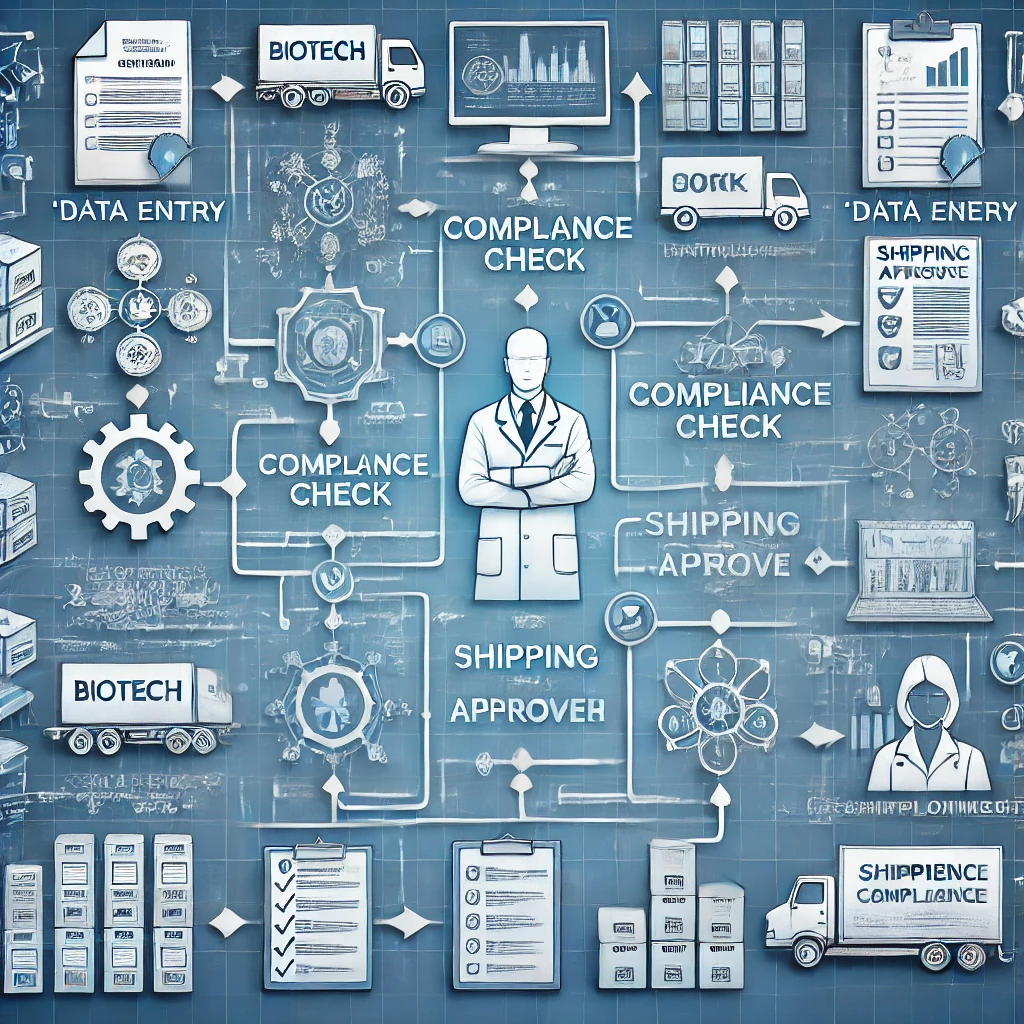In the biotech industry, shipping compliance is not just a requirement—it’s a vital part of ensuring that sensitive materials, from biological samples to clinical trial medications, reach their destination without delay or compromise. However, the complexity of shipping regulations, coupled with the specific roles within a biotech organization, often makes it challenging to ensure that every shipment complies with local and international laws.
Enter role-based workflow automation. This technology revolutionizes the shipping process by streamlining compliance tasks based on the responsibilities of each team member, ensuring a more efficient, error-free operation.
What are Role-Based Workflows?
In any biotech company, different teams—such as scientists, compliance officers, logistics managers, and quality assurance personnel—handle different aspects of shipping. Each role comes with its own set of responsibilities. For example, scientists might focus on data input for materials, while compliance officers ensure regulatory documentation is correct.
With role-based workflows, specific tasks are assigned and automated based on the role of each team member. This ensures that everyone follows the right processes without needing to manually manage every detail. Automating these workflows can significantly reduce the risk of human error and enhance the overall speed and accuracy of the shipping process.

Why Automate Role-Based Workflows in Biotech Shipping?
Shipping in biotech requires precision, compliance, and speed. Here’s why automating role-based workflows can dramatically improve these areas:
- Reduced Errors in Documentation
One of the biggest challenges in biotech shipping is ensuring that all documentation is accurate and compliant with regulations. Each region has specific requirements for documentation, and missing or incorrect paperwork can lead to costly delays. By automating role-based workflows, documents such as customs declarations, Certificates of Analysis (COA), and temperature logs are generated based on pre-set compliance rules, ensuring that no vital details are overlooked. - Streamlined Internal Collaboration
Different departments need to collaborate seamlessly to ensure the shipment process moves smoothly. Role-based automation ensures that each team member receives the tasks they’re responsible for, whether it’s inputting material descriptions, validating shipment conditions, or generating compliance documents. This eliminates the manual back-and-forth and ensures that each stage of the shipping process progresses without delays. - Improved Compliance and Risk Management
Shipping pharmaceutical and biotech materials often involves navigating complex regulations. With automation, companies can ensure that each role-specific task complies with regulatory standards. For example, if a shipment requires specific handling or documentation to meet Good Manufacturing Practice (GMP) standards, the workflow will automatically assign this responsibility to the compliance officer, reducing the risk of non-compliance and improving overall governance. - Time-Saving and Efficiency Gains
Manual processes can slow down shipping operations, especially when multiple teams are involved. Role-based automation helps to accelerate this by eliminating redundant tasks and ensuring that no time is wasted in transitioning from one department to another. Scientists can input their data, compliance officers can quickly validate it, and logistics managers can process the shipment without unnecessary delays. - Scalability for Growing Biotech Companies
As biotech companies grow, so does the complexity of their shipping operations. Manual processes that worked for a small team often become bottlenecks for larger organizations. Automated workflows can easily scale with your business, ensuring that as your shipment volumes increase, your processes remain efficient and compliant.
Key Features of Automated Role-Based Workflows for Biotech Shipping Compliance
- Task-Specific Assignment
Each role within your organization has different responsibilities. Automated workflows assign tasks based on role, ensuring that the right person is handling the right job at the right time. This avoids any confusion and guarantees that every part of the shipping process is compliant and efficient. - Automated Document Generation
Generating and managing documentation manually is time-consuming and prone to errors. With role-based automation, key documents are created and assigned to the appropriate team members for review. These include customs documents, COAs, and packaging information, all aligned with regulatory requirements. - Real-Time Visibility and Alerts
Automated workflows provide real-time visibility into the shipping process. If a task is delayed or incomplete, the system sends alerts to the responsible team member, ensuring issues are resolved promptly. This keeps the shipping process on track and minimizes the risk of delays. - Compliance Monitoring and Reporting
Ensuring compliance isn’t just about creating documents—it’s about tracking and proving compliance at every step. Automated workflows come with built-in compliance monitoring tools that log every action, providing detailed reporting to ensure that the shipping process meets internal and external regulatory standards. - Customizable Workflows
Every biotech company is different. Automated workflows can be customized to fit the specific needs of your business, ensuring that the right processes are in place for your unique shipping requirements.

How Role-Based Workflow Automation Improves Business Outcomes
By automating role-based workflows, biotech companies can achieve several key business benefits:
- Higher Shipment Accuracy: Reduced errors in documentation and data entry lead to fewer delays and more successful shipments.
- Increased Efficiency: Faster processing times allow companies to ship materials more quickly, ensuring that crucial research and clinical trials aren’t delayed.
- Lower Operational Costs: Automating compliance checks and document generation reduces the overhead involved in manually managing shipments, cutting costs for your organization.
- Better Data Insights: With automation, companies can track shipping performance over time, identifying inefficiencies and making data-driven improvements to their workflows.
The Future of Biotech Shipping Compliance is Automated
In a world where the speed and accuracy of shipments can make or break critical research and treatments, automating role-based workflows for biotech shipping compliance is no longer just an option—it’s a necessity. By implementing this technology, companies can ensure that each shipment is processed quickly, compliantly, and with minimal risk of error, paving the way for more efficient operations and successful business outcomes.
Ready to automate your biotech shipping workflows?
Contact us at Pharmalogiks to learn how we can streamline your compliance processes and improve shipment accuracy with role-based workflow automation.


Leave a Reply